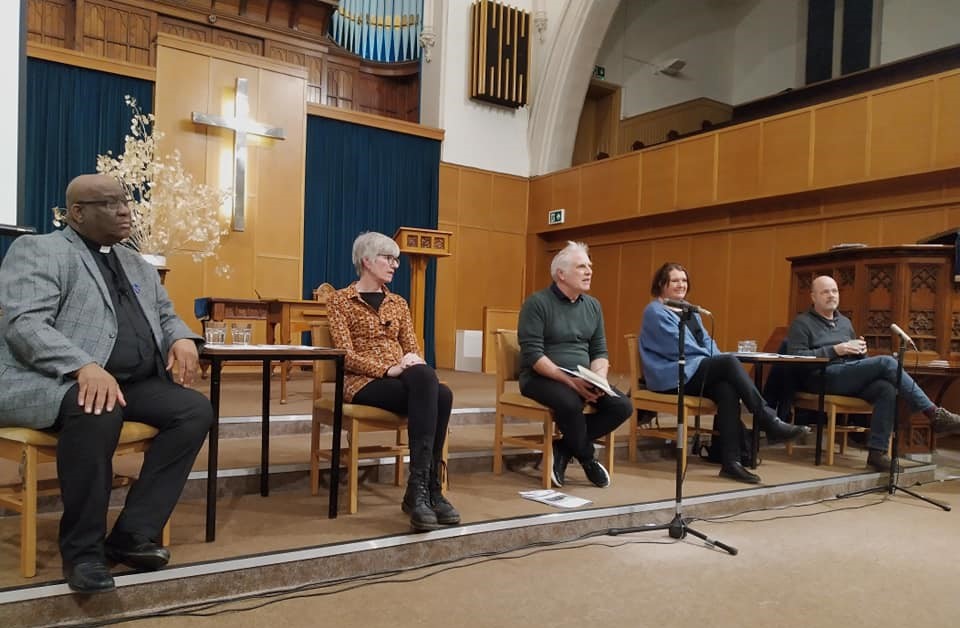
The Life on the Breadline exhibition in Sheffield moves into its second week, and it continues in its attempt to focus thoughts around poverty and church responses to it. On Friday night I was lucky enough to chair an Ask the Panel session with a group of policy makers and leaders to explore some of the issues, the panel comprised: Rev David Bussue (SACMHA & Church of God of Prophecy), Cllr Fran Belbin (Deputy Leader of the Council), Shelley MacDonald (National Energy Action) and Colin Havard (Community Development Co-ordinator-SCC).
The fact that poverty exists in UK in 2024 in undeniable (see footnote link to JRF report 2023), the fact that much of this poverty is linked to the continuing support of “austerity” policy by the Conservative Government is also backed up by the Life on the Breadline research itself. The debate therefore stems around responses to these facts from both policy makers and parts of civic society such as church, faith groups and others where a collective response can be developed.
One central point of discussion was the idea that poverty could somehow be resolved by “increasing the size of the pie” – the political argument that only by economic growth can those at the “bottom” see their living standards raised – contrary to this view is the idea that regardless of “the size of the pie” it is the slices that need to be redistributed more fairly. Our economy and therefore, our society is out of balance with the wealth of a small billionaire elite seeing massive growth whilst the poorest face greater and greater hardship, from the cost of housing, food, fuel and the like outstripping massively any increases in incomes.
As to the Church response to these issues, we were called to be a prophetic voice of challenge, of protest and of hope. If the gospel is not “good news to the poor” it is not the Gospel. Therefore the Church needs to overcome it’s historic reluctance to enter into “political” debate and find it’s voice; importantly however that voice needs to be grounded in listening to the living experiences of those in poverty, those who are struggling, those who too often are rejected and marginalised.
Voices like these, collected in conversations last week by Gavin from Church Action on Poverty (one of the groups featured in the research) who came over to Parson Cross to talk with some of the people attending Community Food Hub:
“It’s been getting harder with prices. Budgeting is harder and harder. Everything is up, and I am diabetic and have to have certain things. It’s hard.”
“The low benefit levels are a big issue for people around here. Reaching a realistic level of income is important for people. We need to see an uplift in benefit levels, and support the real Living Wage.”
“When I do a bit of shopping, everything has gone up, hasn’t it? Just… everything. I got my cost of living payment today, and I am trying to save it for as long as I can.
“I wouldn’t say I live on the breadline but I’m on benefits, and I have to make it stretch as far as I can. It’s harder and harder.”
“Everything is about just, managing, with everything going up, and the cost of living. I am on my own now, and because I’m on a meter I have noticed my bills have jumped again since January. It’s gone up a lot. That has taken away food money, just for trying to keep warm. And that’s not having it warm all the time – I am sitting just in my kitchen, the one warm room.”
“I spoke to my gas company about keeping warm, because I’m asthmatic, and if it’s cold I start coughing. They said there were food banks I should go to for support!”
These are the voices that must be heard, by the Church, by policymakers and politicians, and by the whole of society- only when we honestly engage in conversations about real lives and real people rather than economic ideology and numbers on spreadsheets can we hope to shape policy and practice that makes a real difference to peoples lives.
The final question to panellists at the Life on the Breadline event was whether they thought we would see an end to poverty in UK in their lifetime – whilst there were degrees of hopefulness across the panel the mood was perhaps summed up best in these words “we’ve got to believe we can”
Only if we believe something is possible do we ever stand a chance of making it happen, without that belief there is no hope and we fall into a cycle of depair and powerlessness, Church and other faith based organisations must become part of building this belief, of establishing the hope that we can end poverty within a generation in the UK and build something better and fairer for everyone. In an election year, that really should help to focus our hearts, our minds and our prayers.
1. https://www.jrf.org.uk/work/uk-poverty-2023-the-essential-guide-to-understanding-poverty-in-the-uk